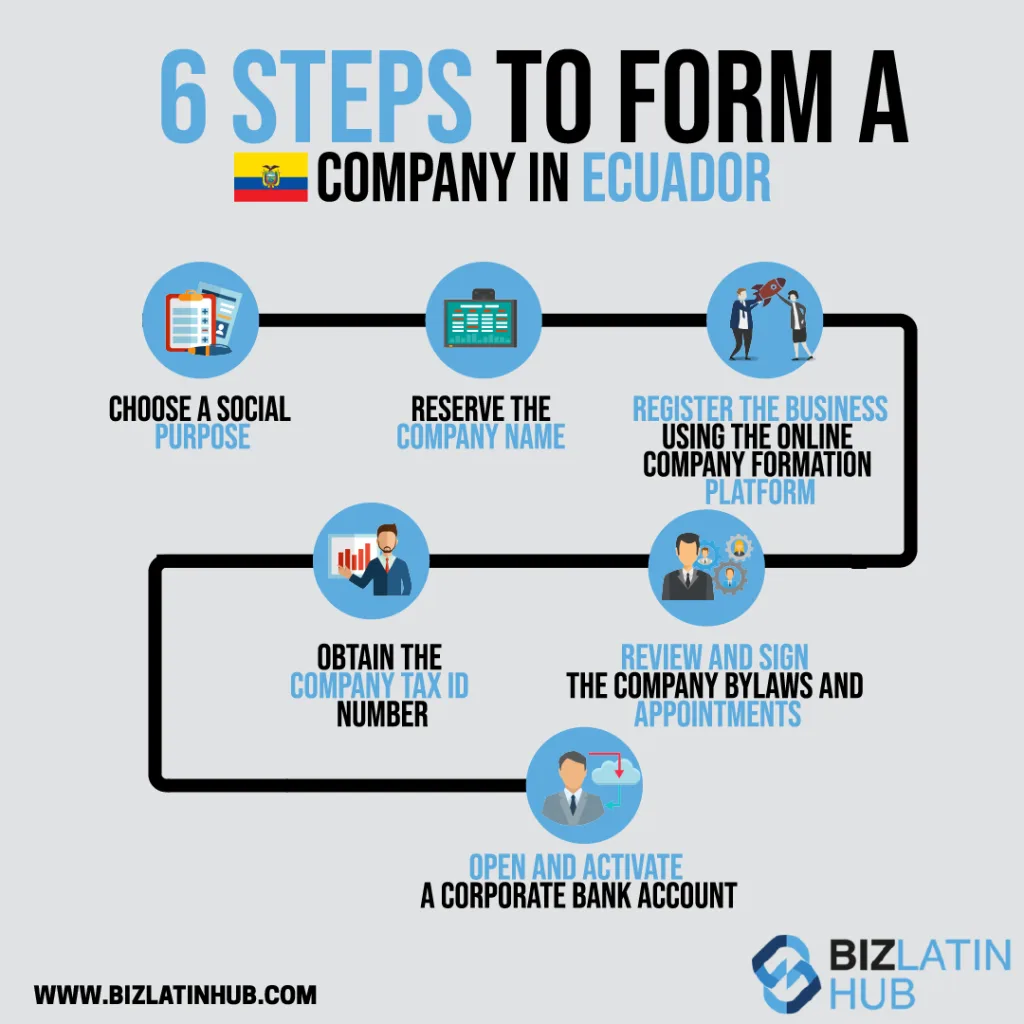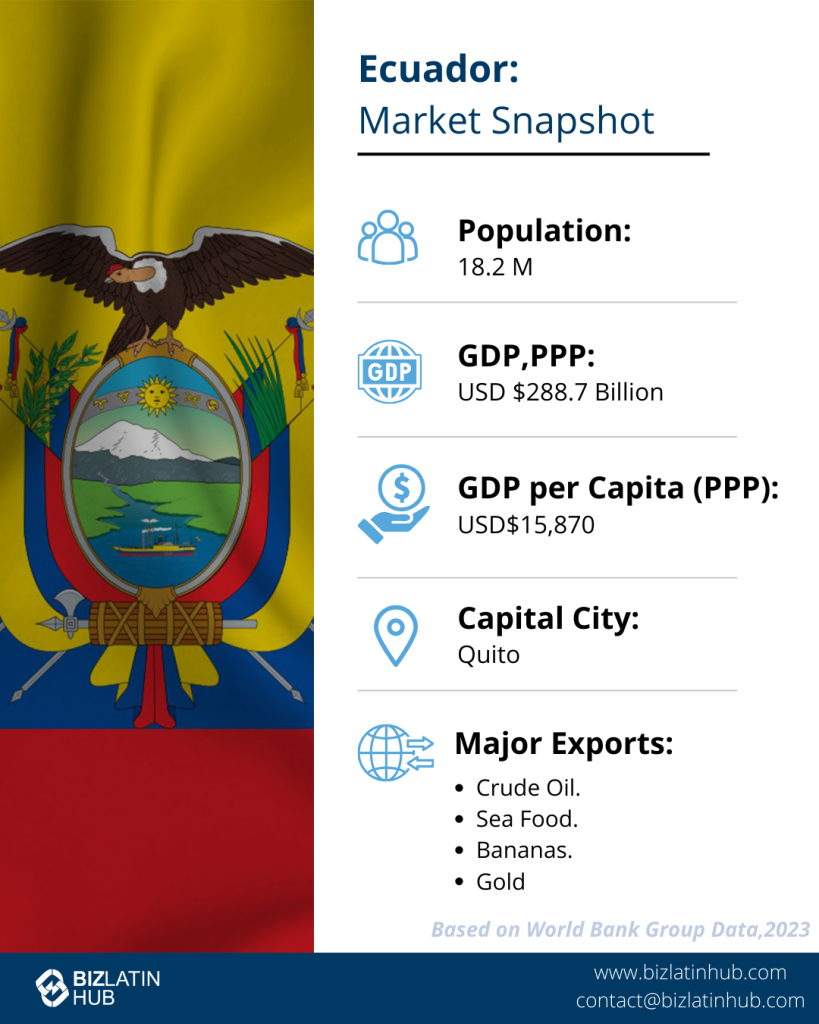After company formation in Ecuador, you will need to find employees. However, this is not always easy for a new entrant to the jurisdiction, meaning you should seek specialist advice. A good recruiter in Ecuador will have expert knowledge of the local market and an established recruitment network to tap into, so should be able to find strong candidates quickly. If hiring in Ecuador interests you, the following article offers an overview of the market and advice on the key sectors to investigate.
Key takeaways on hiring in Ecuador
| What are the key sectors for hiring in Ecuador? | Key sectors in Ecuador include e-commerce Fintech Engineering Renewable energy Tourism |
| Steps to hiring in Ecuador | A local advisor can help you with: Job adverts Networking CV assessment Interviewing Contract writing Onboarding |
| Is PEO legal in Ecuador? | It is not compliant with Ecuadorian law. You will need to establish a company in order to begin hiring in Ecuador. |
| What is the minimum wage in Ecuador? | The current minimum wage as of January 2025 is USD$470. However, there are exceptions in certain sectors. |
| What are the employer contributions in Ecuador? | 11.5% must be paid of an employee’s gross salary. |
What sectors are best for hiring in Ecuador?
Ecuador has traditionally relied on resource extraction, especially in terms of oil and petroleum. However, in recent years the country has been trying to diversify away from this towards sectors such as tourism and tech, while still retaining plenty of knowhow and skill in engineering. Indeed, industry is already turning its gaze towards developing renewable energy in the country.
The country is often overshadowed by bigger neighbors in the region, but has a potent startup ecosystem in creation that is growing fast. Guayaquil, the biggest city and Quito, the capital, particularly stand out in terms of the dynamic tech scene that they are creating.
This is tipped to hit nearly USD$8bn by 2028, with fintech and e-commerce standing out as key hotspots for Ecuadorian talent. Both areas are of key importance to the domestic market as they help avoid often hidebound and overly constrained sectors such as retail and banking.
How much it costs to hire people in Ecuador
The cost of hiring in Ecuador is less than it would be in richer nations, yet workers are often well qualified and skilled. With significant investment in education over a number of years, the Ecuador now has a surfeit of graduates in the labor market that it cannot provide local jobs for. This means that the labor market in Ecuador is relatively competitive for an incoming prospective employer.
The minimum wage in Ecuador is USD$470 per month, with some higher minimum rates in certain industries. However, this is not necessarily the rate that you should be offering. In top sectors that require qualified and skilled workers, you will need to offer at least market standard rate. A local hiring expert in Ecuador will be invaluable in making sure that you are not overpaying or offering unattractive rates that make it hard to recruit quality talent.
Employers in Ecuador must make social security contributions equal to 11.5% of an employee’s wage. The employer must withhold tax at a rate of 9.45% of an employee’s remuneration, with a progressive

Two main options for hiring staff in Ecuador
In practice, companies are known to accept outsourced hiring services in favor of foreign companies not established in the country. However, outsourcing hiring requirements is an unauthorized activity that could create challenges for your new business in Ecuador.
Although outsource hiring processes have been banned since 2008, businesses do have the option of contracting civil services in Ecuador, which can be categorized into two types:
- hiring specialized technical expertise, and
- hiring for support service categories, such as cleaning, security, communications, and others.
It is important that you know the limitations and conditions that would apply for your hiring options in Ecuador.
1: Direct hiring
This is the gold standard of hiring in Ecuador, as it will give you full control over your employees as well as being sure that you will be compliant for the long term. It also gives you a higher status with potential job applicants, who will see you as a more secure long-term employer.
Before you start hiring employees in Ecuador, you will first need to get a sense of the legal, financial and cultural lay of the land. Things such as how to sort out the red tape associated with incorporation and how to manage payroll, for example. With a permanent legal presence in Ecuador, you will be fully liable for compliance with local law.
A local expert will help when hiring in Ecuador, as they will have an extensive network of qualified professionals for top jobs as well as a good idea of the local labor market. They will be able to advise on the best rates to offer and what type of profile you should be targeting. With anti-discrimination legislation important in Ecuador, especially for top jobs, they can make sure you are making a fair offer which complies with local law.
After placing adverts and receiving applications, you will want to move towards interviewing potential candidates. This should be done by both a team manager and HR representative at minimum, to make sure that everything is watertight in legal terms. You may want to include other people into the process in order to make a better assessment of the candidate.
It is entirely possible that you may wish to have a second interview, possibly involving other team members as discussed above. It is also common in the region and when hiring in Ecuador to provide candidates with an aptitude task to be completed. This usually takes the form of a dummy task that simulates the type of job that will be done in the future and confirm that they possess the skills cited on their CV.
Contracts, too, will be important. A local advisor will be up to speed on what you can and cannot offer. Bear in mind that you will have to follow all the rules established by Ecuador. In Ecuador, this includes carefully making sure that the contract complies with the local law regarding outsourcing, especially in cases where it is close to regular employment. You need to make sure that you do not cross that line.
Finally, your local advisor will be able to help you with the stages of both the hiring and onboarding process. They will make sure that you comply with standard requirements such as compulsory medical checks and make sure that any probation period is within the boundaries of those established by the labor law in Ecuador. This is generally two months.
2. Hire contractors through the Civil Services Provision
It is legally possible to form civil contracts for hiring staff in Ecuador to provide specialized technical services, such as consulting. This arrangement is made under what’s called a service provision regime. Employers can choose to hire for these services, provided that the following conditions are met:
- The contracted service does not constitute habitual activity or the essence of the business
- The person providing the service has an independent physical, economic and administrative infrastructure, i.e. they’re operating their own business
- The service must be provided in the contractor’s own facilities.
On the other hand, it is forbidden to enter into civil contracts with natural persons if the relationship with them demonstrates any of the following elements:
- Provision of lawful and personal services
- Relationship dependency or legal subordination that implies working hours and compliance with the employer’s orders.
- Payment of remuneration or salary.
Additionally there should be no elements of a labor relationship in your engagement with a provider of specialized technical services.
Interpreting Ecuadorian employment law
In Ecuador, the principle of interpretation is in favor of the employee in case of doubt. Therefore, even if someone is hired under a service provision regime, if elements of an employment relationship exist in that engagement, there’s a risk that your business may encounter legal challenges by the state or your employee.
If the existence of an employment relationship is determined, the employee would be granted the right to be recognized for all elements of an employee-employer relationship that were not previously paid or recognized under the service provision relationship.
Additionally, during a potential labor dispute, local authorities may conclude that the relationship with suppliers simply constituted a simulation of outsourcing, intermediation or any other form of service provision agreement. This decision could impose a fine to the employer totaling up to 20 minimum salaries for each worker involved in the dispute.
Before making a move into the jurisdiction, it’s important for companies to understand the labor rights and responsibilities of both employers and employees in Ecuador. What follows are a few things that foreign business owners should know about when it comes to the local work culture:
- Work hours – The standard workday in Ecuador is eight hours, with the standard workweek up to 40 hours.
- Public holidays – There are 13 public holidays in Ecuador each year.
- Vacation time – Workers in Ecuador are eligible for at least 15 days of vacation annually. Women are entitled to 12 weeks’ maternity leave.
- Contract types – There are essentially two types of contract in Ecuador, indefinite employment and fixed-term employment.

FAQs on hiring in Ecuador
Based on our extensive experience these are the common questions we receive from clients when looking to hire in Ecuador.
1. Why hire talent in Ecuador?
Hiring in Ecuador offers access to a large talent pool that is located in the same time zone as the North American market, is culturally similar, and is more economical. The combination allows a company to complement an existing North American based team or to establish an independent nearshoring center within the region.
2. Can I hire top talent in Ecuador?
Yes, you can hire top talent in Ecuador, often at more competitive prices than in your local market.
3. What is the level of English for professionals?
University graduates are expected to complete English language proficiency to at least an intermediate level. This means that the general level of English competency in white collar jobs such as programming is solid.
4. How strong is the IT market in Ecuador?
It is tipped to hit nearly USD$8bn before the end of the decade and showing average growth rates in the double digits.
Doing business in Ecuador

The Ecuadorian government is investing heavily in anticorruption measures alongside economic reforms aimed at making it easier to do business and cutting unnecessary red tape.
While this is underway, foreign companies can expect to find opportunities in developing and emerging industries such as online commerce and fintech, and other technological innovation that is sweeping through the region.
Ecuador’s geographic location and well-established regional trade routes offer businesses expansive reach into both Northern and Southern parts of the continent.
Having the US Dollar as their currency can also simplify invoicing and transactions, removing foreign exchange mechanisms and fees.
While hiring staff in Ecuador may present challenges, the countries offer many advantages to entrepreneurs and multinationals looking to begin commercial operations on its shores.
Biz Latin Hub can help you with hiring staff in Ecuador
At Biz Latin Hub, we offer a comprehensive range of market entry and back-office solutions across Latin America and the Caribbean.
With offices in key cities across the region, along with trusted partners in other markets, our extensive reach makes us well-suited to support cross-border operations and multi-jurisdiction market entries.
As well as knowledge about hiring in Ecuador, our portfolio of services includes hiring & PEO accounting & taxation, company formation, bank account opening, and corporate legal services.
Contact us today to find out more about how we can assist you in finding top talent or otherwise doing business in Latin America and the Caribbean.
If this article on tips for hiring in Ecuador was of interest to you, check out the rest of our coverage of the region. Or read about our team and expert authors.






